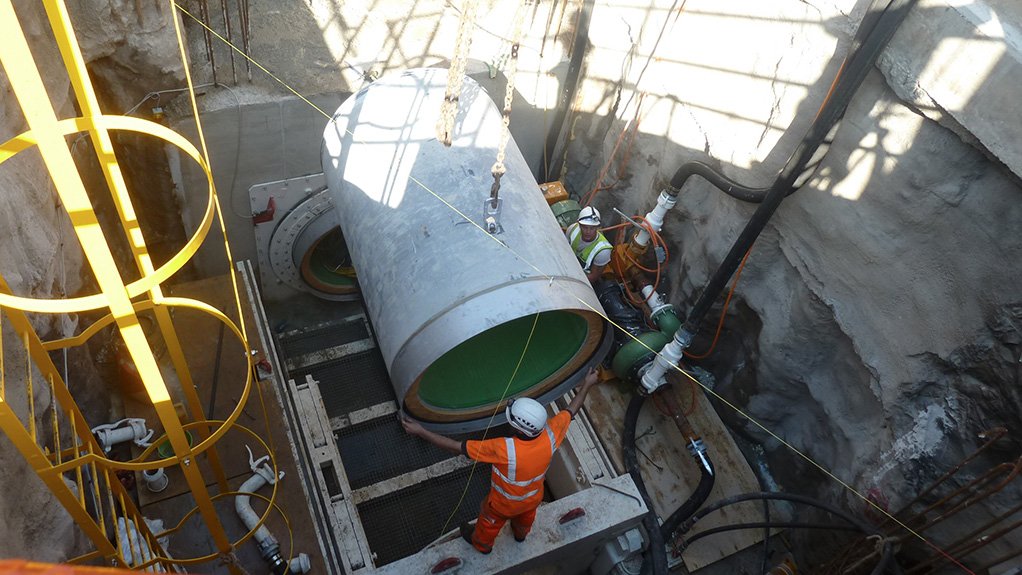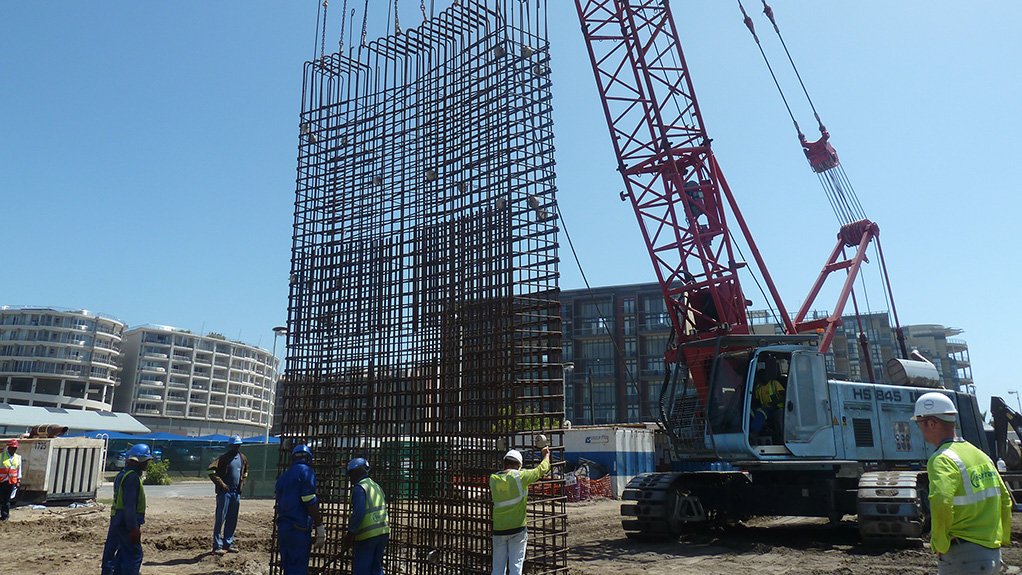EPCM firm completes Southern Africa’s first microtunnel



MICRO-TUNNEL INSTALLATION The micro-tunnel is the first of its kind in sub-Sahara Africa
MAHATMA GANDHI SEWER Hatch Goba’s multimillion-rand sewerage tunnel hosts two separate sewer pipes, communication cables, water pipes and electrical cables used on the dock
Engineering and project implementation firm Hatch Goba has completed the construction of a R120-million sewer relocation project – the Mahatma Gandhi Road Sewer Pumpstation project – in Durban, KwaZulu-Natal.
Hatch Goba tunnels, geotechnical and trenchless technology infrastructure regional manager Montso Lebitsa tells Engineering News that the project, which was completed in November 2014, was first initiated in 2005 by former engineering firm Goba – before Goba merged with former engineering firm Hatch to become Hatch Goba – when it constructed a harbour tunnel in the Durban central business district (CBD). Construction of the tunnel was completed in 2007. The 4-m-diameter harbour tunnel hosts two separate sets of sewerage pipes, communication cables, water pipes and electrical cables.
He explains that, after the success of the harbour tunnel, the eThekwini municipality contracted Hatch Goba in 2010 to relocate eThekwini’s point pumpstation and move it away from the CBD. Moving the pumpstation required extending the gravity pipeline by 221 m.
Lebitsa explains that, after thorough consideration of the pumpstation’s location and the businesses situated at the location, Hatch Goba devised a two-phased solution.
Phase 1: The Microtunnel
The first part of Phase 1 involved the construction of a 1.2-m-diameter microtunnel between the old pumpstation and the new pumpstation positions. Lebitsa states that the tunnel is the first of its kind in sub-Saharan Africa.
“Though it had never been done in sub-Saharan Africa, our studies found that the microtunnel was the most cost-effective and efficient solution to the municipality’s challenge, as it provides the most appropriate and least risky solution for the extension of the sewer under the congested Mahatma Gandhi road,” details Lebitsa.
The second part of the first phase of the project was to construct a 221-m-long micro-tunnel below Mahatma Gandhi road. The actual drive time of the tunnel took only 24 days excluding set-up durations.
Lebitsa states that the ground conditions, limited working space, the size of the sewer and vertical alignment control were some of the primary factors that influenced Hatch Goba’s choice to use the microtunnelling technique – an unmanned mechanised pipe-jacking technology, whereby all the jacking and alignment are controlled from a computerised control cabin at the top of the jacking pit.
The 221-m-long microtunnel comprises a 113 m straight section from the jacking pit – a 102 m curved length with 350 m radius – to bypass the protected historical Harbour Master Building – and a 6 m straight section, which breaks into the existing harbour tunnel.
Phase 2: The Pumpstation
Once the microtunnel was completed in 2013, the new pumpstation was constructed. The pumpstation comprises four main components: a screening chamber, a wet well, a dry well and a surface structure. The station houses four 250 kW immersible pumps, connected to two 1 000 mm rising mains that cross the harbour through the tunnel.
The pumps are also connected to a combination of stainless steel and high-density polyethylene pipes, ranging between 600 mm and 1 000 mm in diameter. The pumpstation operates automatically, depending on inflow, which varies over a 24-hour period, into the station.
The pumpstation also features a ventilation system, an odour-control system, a backup generator and several sluice gates that enable an operator to isolate some sections of the station.
The inlet sluice gate is programmed to close when power failures occur. Its motor is controlled by an uninterrupted power supply unit, which closes the gate when there is no power, thereby preventing the pumpstation from flooding.
About Lebitsa
Lebitsa has been overseeing these projects since their inception. He says Hatch Goba aims to be at the forefront of the latest technology in the country. Born in Bloemfontein and raised in Lesotho, Lebitsa completed his civil engineering studies in Russia.
Some of the biggest projects he has worked on include Phases 1 and 2 of the Lesotho Highlands water project and the Gautrain project. Lebitsa says he developed his passion for tunnelling, shafting and trenching technology when he worked in the UK for three years before joining Goba in 2005.
He adds that Hatch Goba has been noting growing demand for its alternative-technology engineering, adding that the company is working on a similar sewer project in East London, in the Eastern Cape.
He concludes that Hatch Goba was recently recognised for its work on the Mahatma Gandhi Road Sewer Pumpstation project, as it received a divisional award for operation and maintenance projects in October 2014 from the South African Institution of Civil Engineering.
Comments
Press Office
Announcements
What's On
Subscribe to improve your user experience...
Option 1 (equivalent of R125 a month):
Receive a weekly copy of Creamer Media's Engineering News & Mining Weekly magazine
(print copy for those in South Africa and e-magazine for those outside of South Africa)
Receive daily email newsletters
Access to full search results
Access archive of magazine back copies
Access to Projects in Progress
Access to ONE Research Report of your choice in PDF format
Option 2 (equivalent of R375 a month):
All benefits from Option 1
PLUS
Access to Creamer Media's Research Channel Africa for ALL Research Reports, in PDF format, on various industrial and mining sectors
including Electricity; Water; Energy Transition; Hydrogen; Roads, Rail and Ports; Coal; Gold; Platinum; Battery Metals; etc.
Already a subscriber?
Forgotten your password?
Receive weekly copy of Creamer Media's Engineering News & Mining Weekly magazine (print copy for those in South Africa and e-magazine for those outside of South Africa)
➕
Recieve daily email newsletters
➕
Access to full search results
➕
Access archive of magazine back copies
➕
Access to Projects in Progress
➕
Access to ONE Research Report of your choice in PDF format
RESEARCH CHANNEL AFRICA
R4500 (equivalent of R375 a month)
SUBSCRIBEAll benefits from Option 1
➕
Access to Creamer Media's Research Channel Africa for ALL Research Reports on various industrial and mining sectors, in PDF format, including on:
Electricity
➕
Water
➕
Energy Transition
➕
Hydrogen
➕
Roads, Rail and Ports
➕
Coal
➕
Gold
➕
Platinum
➕
Battery Metals
➕
etc.
Receive all benefits from Option 1 or Option 2 delivered to numerous people at your company
➕
Multiple User names and Passwords for simultaneous log-ins
➕
Intranet integration access to all in your organisation



















